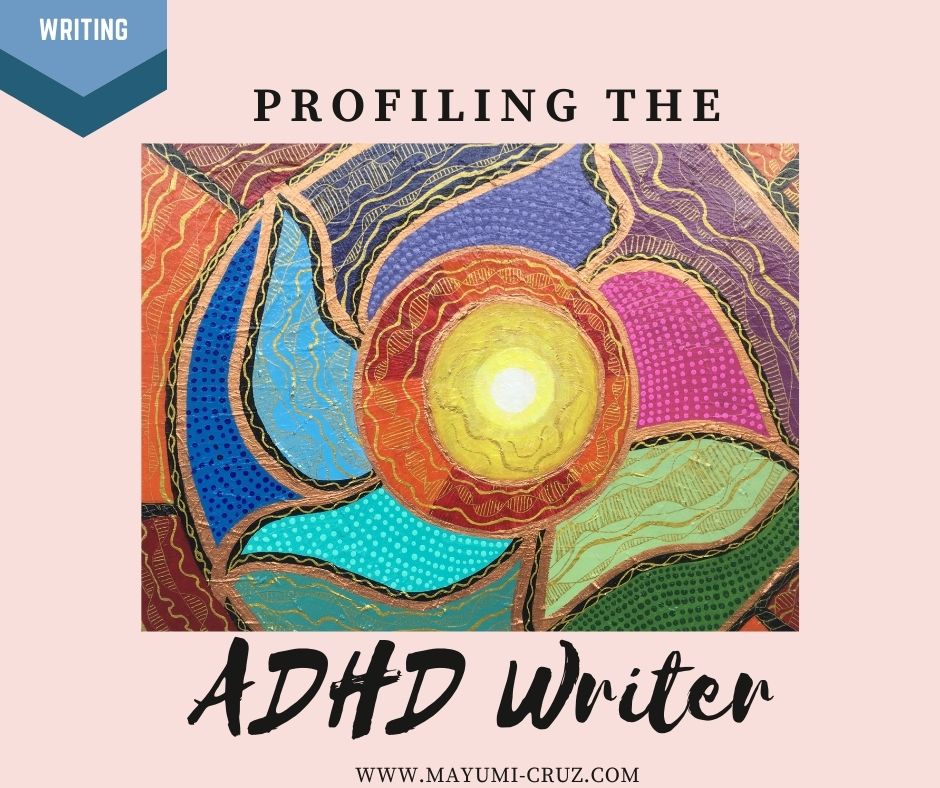Profiling the ADHD Writer
“When most people think of Attention Deficit Hyperactivity Disorder, they imagine a little boy who can’t sit still at his desk, a kid who’s disruptive and loud. The truth isn’t quite so simple, especially for women, who often fail to be diagnosed in childhood because their symptoms present differently. For a lot of girls and women, having ADHD means they’re easily distractable, suffer from lack of focus, procrastinate or have problems with short-term memory or deviations from routine.”
The above quote is from an article by author Nicole Bross, which perked my curiosity.
For a lot of people, being easily distractible, lacking in focus, perennial procrastinator, or having a hard time remembering things meant lack of discipline and self-control.
But it turns out that for some people, it is more than that. It’s a medical condition known as ADHD or Attention Deficit Hypersensitivity Disorder.
According to ADDitude Mag, attention deficit hyperactivity disorder (ADHD) is a neurological disorder that impacts the parts of the brain that help us plan, focus on, and execute tasks. ADHD symptoms vary by sub-type — inattentive, hyperactive, or combined — and are often more difficult to diagnose in girls and adults.
Nicole Bross admitted that, “the refrain in my head was one of constant beratement, belittling self-talk and comparing myself with others who seemed to be able to perform their day-to-day tasks without effort. Meanwhile, I’d forgotten to do the laundry four days in a row, somehow skipped brushing my teeth and was behind on all my work deadlines.”
The ADHD Writer
Moreover, in terms of writing, Nicole said, “Writing was a near-impossible task. It would take me an hour or more to actually start typing out words after my writing time, so rare to begin with, began. Between the time I opened my laptop (where even is my laptop, anyway?) and when I actually started putting down words, I’d somehow fall into a hole of checking email, social media, watching videos, skimming news articles and doing ‘research’ (actually reading random Wikipedia articles). The entire time this was going on, I’d be mentally criticizing myself for not using that time to write, which would bring my mood even lower, but I literally could not start writing until I’d exhausted all those other distractions.”
Indeed, editor and story consultant Lara Willard attests that motivation and focus are difficult for ADHD writers.
But there are other things with which ADHD affects a writer.
There’s perfectionism and the fear of failure or rejection, according to Lara.
There is also poor working memory where people with ADHD find it hard to remember specific vocabulary and grammatical rules. Working memory involves storing, prioritizing, and utilizing information. ADHD writers often struggle to find the right word at the right time.
Consequently, this problem with working memory results in disorganized and unfocused writing, and also rambling and going off tangents in discussions with other people despite having stronger verbal skills.
In addition, ADHD writers have an excess of ideas. This is a gift, but can also turn into a burden because having different ideas all at once can mess up the ADHD brain resulting in paralysis of activity instead of being motivated.
I find myself relating to these words and out of curiosity, I took an online test for ADHD.
I wasn’t really surprised by the results. For a long time, I’ve wondered what was wrong with me. On top of age-related illnesses, I’ve always struggled with something I couldn’t place my fingers on which severely affects my productivity, and inevitably, my zest for writing and creating. Now I know. Instead of being sad, I was relieved that at last, there was a name for what I have been going through, had in fact been through in all the years back.
Pending an official diagnosis, several websites, YouTube channels and podcasts have helped me understand more about ADHD, specifically for writers and creatives like me.
Here are some which I find very helpful:
Understanding Writers with an ADHD Brain
ADHD and Writing: Challenges and Strategies
Tools and Tricks for Writers with ADHD
It’s comforting to learn that there are writers like me out there, and that some have been successful in accepting and overcoming their affliction, and are successful in their careers, too.
It’s not something to be ashamed of, or something to mock or pity.
Neurodivergents, under which ADHD persons are categorized together with people with autism, bipolar disorder, dyslexia, and others, simply have brains which process, learn, and/or behave differently from what is considered “typical.”
Understanding this can help reduce stigma around learning and thinking differences among us.
We’re still earthlings, you know. We’re not from planet Mars. 😉
BOOKS ON ADHD
ADHD PLANNERS / ORGANIZERS
ADHD ITEMS
TRENDING NOW











1 thought on “Profiling the ADHD Writer”